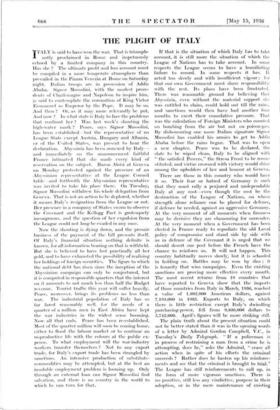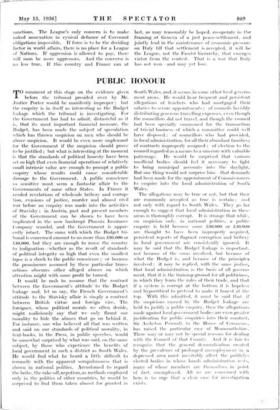THE PLIGHT OF ITALY I TALY is said to have won
the war. That is triumph- antly proclaimed in Rome and impetuously echoed by a limited company in this country. Has she ? The ultimate profit and loss account must he compiled in a more temperate atmosphere than prevailed in the Piazza Venezia at Rome on Saturday night. Italian troops are in possession of AddiS Ababa. Signor Mussolini, with the modest prece- dents of Charlemagne and Napoleon to inspire him, is said to contemplate the "coronation of King Victor Emmanuel as Emperor by the Pope. It may be so. And then ? Or, as it may more relevantly be put, And now ? In what state is Italy to face the problems that confront her ? Was last week's shouting the high-water mark ? Peace, says Signor Mussolini, has been established—but the representative of no League State except Austria, Hungary and Albania, or of the United States, was present to hear the declaration. Abyssinia has been annexed by Italy-- and inimediately on the announcement faithful France intimated that she made every kind of reservation on the subject. Baron Aloisi at Geneva on Monday protested against the presence of an Abyssinian representative at the League Council table—and forthwith the Abyssinian representative was invited to take his place there. On Tuesday, Signor Mussolini withdrew his whole delegation from Geneva. That is not an action to be deplored, whether it means Italy's resignation from the League or not. Her presence in a company of States sworn to observe the Covenant and the Kellogg Pact is grotesquely incongruous, and the question of her expulsion from the League could not long be evaded in any case.
• Now the shouting is dying down, and the prosaic business of the payment of the bill presents itself. Of Italy's financial situation nothing definite is known, for all information bearing on that is withheld. But she is believed to have lost. practically all her gold, and to have exhausted the possibility of realising her holdingS of foreign securities. The figure to which the national debt has risen since the inception of the Abyssinian campaign can only be conjectured, but it is computed in responsible quarters that the interest on it amounts to not much less than half the Budget revenue. Tourist traffic this year will suffer heavily. Peace, moreover, brings its problems no less than war. The industrial population of Italy has so far fared reasonably well, for the needs of a quarter of a million men in East Africa have kept the war industries in the widest sense booming. Now all that ends. Peace has been re-established. Most of the quarter million will soon be coming home, either to flood the labour market or to continue an unproductive life With the colours at the -public ex- pense. To what employment will the war-industry workers transfer themselves ? Not 'to any export trade, for Italy's export trade has been strangled by sanctions. An intensive production of substitute- commodities may be attempted, but at the best an insoluble employment problem is looming up. Only through an external loan can SignOr Mussolini find salvation, and there is no country in the world to which lie can turn for that. If that is the situation of which Italy has to take account, it is still more the situation of which the League of Nations has to take account. In some respects the League seems to have a humiliating failure to record. In some respects it has. It acted too slowly and with insufficient vigour ; for that our own Government must share, responsibility with the rest. Its plans have been frustrated. There was reasonable ground for belieVing that Abyssinia, even without the material support she was entitled to claini, could hold out till the rains, and sanctions would then have had another four months to exert their cumulative pressure. That was the calculation of Foreign Ministers who counted on bombing from the air but not on poison-gas. By dishonouring one more Italian signature Signor Mussolini has enabled his armies to get to Addis Ababa before the rains began. That was to open a new chapter. Peace was to be declared, the slate to be wiped clean, Italy to be aligned with " the satisfied Powers," the Stresa Front to be recon- stituted, and virtue crowned with victory would shine among the upholders of law and honour at Geneva.
There are those in this country who would have it so. Their fear or hatred of Germany is such that they must rally a perjured and undependable Italy at any cost—even though the cost be the destruction of the League of Nations, on whrise strength alone reliance can- be placed for defence, if defence be needed, against an aggressive Germany. At the very moment of all moments when firmness may be decisive they are clamouring for surrender. At the very moment when a Government has been elected in France ready to repudiate the old Laval policy of compromise and stand side by side with us in defence of the Covenant it is urged that we should desert our post before the French have the chance to reinforce us. It will not happeri. This country habitually moves slowly, but it is Schooled in holding on. Battles may be won by élan ; it is tenacity that wins campaigns. Even. the existing sanctions are proving more effective every month. The most recent returns from 19 countries that have reported to Geneva show that the imports of those countries from Italy in March, 1936, reached a value of 1,802,000 American dollars, against 7,194,000 in 1935. Exports to Italy, on which there is little restriction except Italy's dwindling purchasing-power, fell from 9,836,000 dollars to 5,742,000. April's figures will be more striking still.
The plain truth about the present situation could not be better stated than it was in the opening words of a letter by Admiral Gordon Campbell, V.C., in Tuesday's Daily Telegraph. " If a policeman is in process of restraining a man from a crime he is attempting, does he," asks the Admiral, " cease all action when in spite of his efforts the criminal succeeds ? Rather does he hasten up his reinforce- ments and see that the criminal is brought to trial." The League has still reinforcements to call up, in the form of more vigorous sanctions. There is no punitive, still less any vindictive, purpose in their adoption, or in the mere maintenance of existing sanctions. The League's only concern is to make naked annexation in cynical defiance of Covenant obligations impossible. If force is to be the deciding factor in world affairs, there is no place for a League of Nations. aggression is allowed to pay, there will Soon be more aggressors. And the converse is 110 less true. If this country and France can at last, as may reasonably be hoped, co-operate in the framing at Geneva of a just peace-settlement, and jointly lead in the-maintenance of economic pressure on Italy till that settlement is accepted, it will be the League, not the Fascist hierarchy, that emerges victor from the contest. That is a war that Italy has not won—and may vet lose.























































 Previous page
Previous page